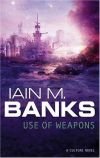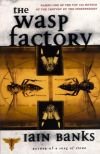
Whit, or, Isis amongst the unsaved is a novel by the Scottish writer Iain Banks, published in 1995. Isis Whit, a young but important member of a small, quirky cult in Scotland, narrates. The community suspects that Isis' cousin Morag is in danger, and sends Isis out to help.

Walking on Glass is the second novel by Scottish writer Iain Banks, published in 1985. Banks would go on to write several more novels before his death in 2013, including several acclaimed science fiction novels that formed the Culture series. Walking on Glass is formed of three storylines that initially do not appear …

Use of Weapons is a science fiction novel by Scottish writer Iain M. Banks, first published in 1990 as the third novel in the Culture series.

Transition is a novel by Iain Banks, first published in 2009. The American edition was published under the name "Iain M. Banks", which is the name Banks used for his science fiction work.

The polarizing literary debut by Scottish author Ian Banks, The Wasp Factory is the bizarre, imaginative, disturbing, and darkly comic look into the mind of a child psychopath.Meet Frank Cauldhame. Just sixteen, and unconventional to say the least: Two years after I killed Blyth I murdered my young brother Paul, for …

The Steep Approach to Garbadale is a novel by the Scottish writer Iain Banks, published in 2007. The novel had at least two working titles, Matter and Empire!

The State of the Art is a short story collection by Scottish writer Iain M. Banks, first published in 1991. The collection includes some stories originally published under his other byline, Iain Banks as well as the title novella and others set in Banks' Culture fictional universe.

The Culture - a human/machine symbiotic society - has thrown up many great Game Players, and one of the greatest is Gurgeh. Jernau Morat Gurgeh. The Player of Games. Master of every board, computer and strategy. Bored with success, Gurgeh travels to the Empire of Azad, cruel and incredibly wealthy, to try their …

From its bravura opening onwards, THE CROW ROAD is justly regarded as an outstanding contemporary novel. 'It was the day my grandmother exploded. I sat in the crematorium, listening to my Uncle Hamish quietly snoring in harmony to Bach's Mass in B Minor, and I reflected that it always seemed to be death that drew me …

 English
English Español
Español Deutsch
Deutsch
